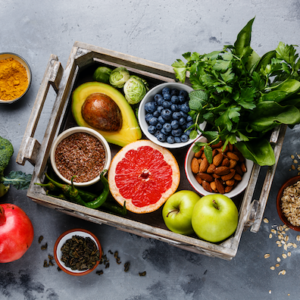The Profound Impact of Diet on Aging
We’re all aware of the adage “you are what you eat,” but have you ever thought about how profoundly your diet affects your aging process? The connection between diet and aging is a fascinating and complex one. It’s a relationship that we are beginning to understand more and more thanks to ongoing research in the fields of nutrition and gerontology. What we consume not only fuels our bodies, but it also influences our longevity and the quality of our later years.
The food choices we make can either promote healthy aging or increase our risk for various age-related diseases. Our diet can influence our cognitive function, heart health, bone density, and even the appearance of our skin. As the saying goes, “an ounce of prevention is worth a pound of cure,” and in this context, it means that a balanced, nutrient-rich diet can help slow down the aging process and keep us feeling youthful and vibrant.
Aging is a natural process, but how we age is significantly influenced by lifestyle factors, including diet. The link between diet and aging isn’t just about preventing diseases or maintaining a healthy weight. It’s about living a vibrant and active life in our golden years. So, let’s dive in and explore the fascinating relationship between diet and aging.
The Science Behind Diet’s Impact on Aging
The science that links diet and aging is multifaceted and complex, but it can be boiled down to a few key concepts. First, it’s crucial to understand that our bodies are continually undergoing a process known as cellular oxidation. This process, which involves the reaction of our cells with oxygen, can lead to the production of harmful molecules known as free radicals. These free radicals can cause tissue damage and contribute to aging and various diseases.
Research in the field of gerontology (the science of aging) shows a clear connection between diet and cellular health. Certain foods can help protect our cells from damage, promote their repair, and even stimulate the growth of new, healthy cells. On the other hand, a diet high in processed foods, sugars, and unhealthy fats can accelerate the aging process by triggering inflammation and oxidative stress.
Another aspect of the diet’s impact on aging revolves around the idea of caloric restriction. Studies have shown that reducing caloric intake without causing malnutrition can extend lifespan in various organisms. The theory is that caloric restriction triggers a survival mechanism that enhances cellular repair and protection, thus slowing down the aging process.
Superfoods That Slow Down the Aging Process
While a balanced diet is key to healthy aging, some foods, often referred to as “superfoods,” have particularly powerful anti-aging properties. These foods are nutrient-dense and packed with antioxidants that can help slow down the aging process.
Berries, for example, are loaded with antioxidants that fight inflammation and oxidative stress, two key contributors to aging. Leafy green vegetables like spinach and kale are packed with vitamins A, C, and K, which promote skin health and slow down the aging process.
Avocados are rich in healthy fats and antioxidants that promote heart health and support skin hydration and flexibility. Similarly, fatty fish like salmon and mackerel are packed with omega-3 fatty acids that support brain health and slow down cognitive decline.
Lastly, nuts and seeds are rich in fiber, protein, and healthy fats, all of which are key for healthy aging. Incorporating these superfoods into your diet can go a long way in promoting longevity and vitality.
The Role of Antioxidants and Aging
Antioxidants are substances that can prevent or slow down damage to cells caused by free radicals. This cell damage can result in aging and various diseases. Antioxidants act like bodyguards for our cells, protecting them from harmful molecules and repairing damage that has already occurred.
Some of the most potent antioxidants include vitamins A, C, and E, selenium, and flavonoids. These are found in a variety of fruits, vegetables, nuts, seeds, and even in dark chocolate and red wine. By including a variety of these antioxidant-rich foods in our diet, we can better protect our cells and slow down the aging process.
However, it’s important to remember that getting antioxidants from whole foods is much more beneficial than taking supplements. This is because whole foods provide a complex mix of nutrients and antioxidants that work together, enhancing their overall effectiveness.
The Impact of a High-Sugar Diet on Aging
While a little sugar in our diet is harmless, a diet high in sugar can have a detrimental impact on aging. Consuming excessive amounts of sugar can lead to weight gain, which increases the risk of various age-related diseases such as heart disease and type 2 diabetes.
Moreover, sugar can accelerate the aging process at a cellular level. It can cause inflammation, oxidative stress, and damage to our cells. This is particularly evident in the skin, where excess sugar can lead to premature wrinkles and a loss of elasticity.
Furthermore, a high-sugar diet can negatively impact brain function. Studies have linked high sugar intake to an increased risk of cognitive decline and Alzheimer’s disease. Reducing sugar intake can therefore be a significant step towards healthy aging.
How a Balanced Diet Can Promote Healthy Aging
A balanced diet is one that provides our bodies with all the nutrients it needs to function optimally. It includes a variety of foods from all food groups, in the right proportions. A balanced diet is critical for healthy aging because it ensures that our bodies get a diverse range of nutrients that support cellular health, boost immunity, and prevent chronic diseases.
A balanced diet should include plenty of fruits and vegetables, lean proteins, whole grains, and healthy fats. This combination provides a wealth of vitamins, minerals, antioxidants, fiber, and omega-3 fatty acids, all crucial for healthy aging.
Regular hydration is also a key part of a balanced diet. Water is essential for virtually all bodily functions and is especially important for maintaining skin health and preventing cognitive decline.
Case Studies: Diet’s Impact on Aging
There’s a wealth of scientific evidence supporting the impact of diet on aging. For example, studies on the Mediterranean diet, which is rich in fruits, vegetables, whole grains, and olive oil, have shown that it’s associated with longevity and a lower incidence of chronic diseases.
Another study, published in the Journal of Gerontology, found that a diet rich in certain foods, including fruits, vegetables, fish, and nuts, was associated with a longer telomere length, a marker of slower cellular aging.
A fascinating study on the Okinawans in Japan, known for their exceptional longevity, revealed that their traditional diet, low in calories but high in nutrients, could be a key contributing factor to their long lives.
These case studies underscore the profound impact of diet on aging and the importance of adopting healthy eating habits for a long and vibrant life.
Tips for Maintaining a Healthy Diet for Graceful Aging
Maintaining a healthy diet for graceful aging doesn’t have to be complicated. Here are some simple tips to get you started:
- Eat a variety of foods: This ensures that you get a broad range of nutrients that your body needs to function optimally.
- Prioritize fruits and vegetables: They are packed with vitamins, minerals, and antioxidants that protect against aging.
- Choose whole grains: These provide essential fiber and keep your digestive system healthy.
- Limit processed foods: They tend to be high in unhealthy fats, sugars, and sodium, which can accelerate aging.
- Stay hydrated: Water is crucial for all bodily functions and helps maintain skin health.
If you’re finding it challenging to prepare balanced, nutrient-rich meals, consider using a personal chef meal service like Chefs for Seniors. They can tailor meals to your dietary needs and preferences, making healthy eating easier and more enjoyable.
Conclusion: The Profound Impact of Diet on Aging
The connection between diet and aging is indeed profound. Our food choices can significantly influence the quality and longevity of our lives. By adopting a balanced, nutrient-rich diet, we can promote healthy aging and enjoy our golden years with vitality and grace.
Remember, it’s never too late to start making healthier food choices. Every meal is an opportunity to nourish your body and slow down the aging process. So why not seize the moment and start your journey towards healthier, graceful aging today?




